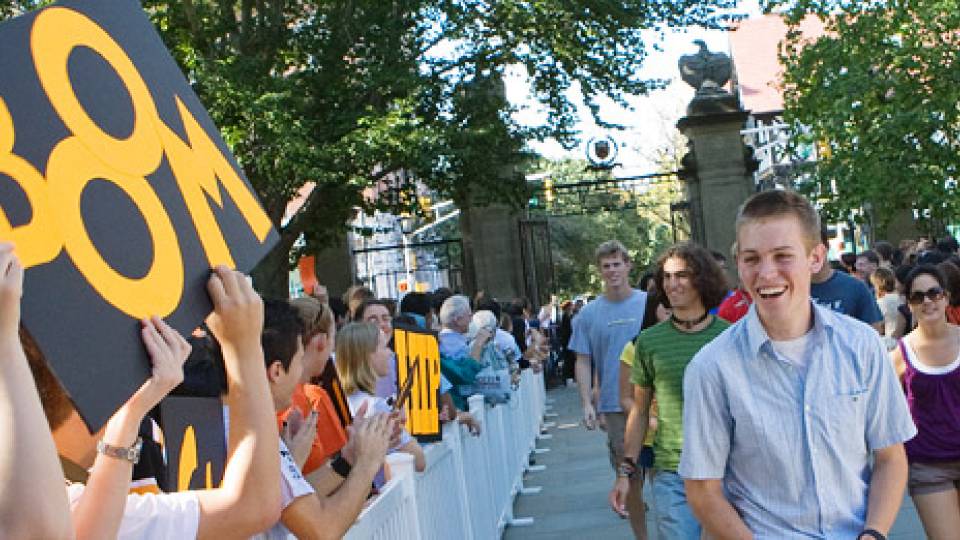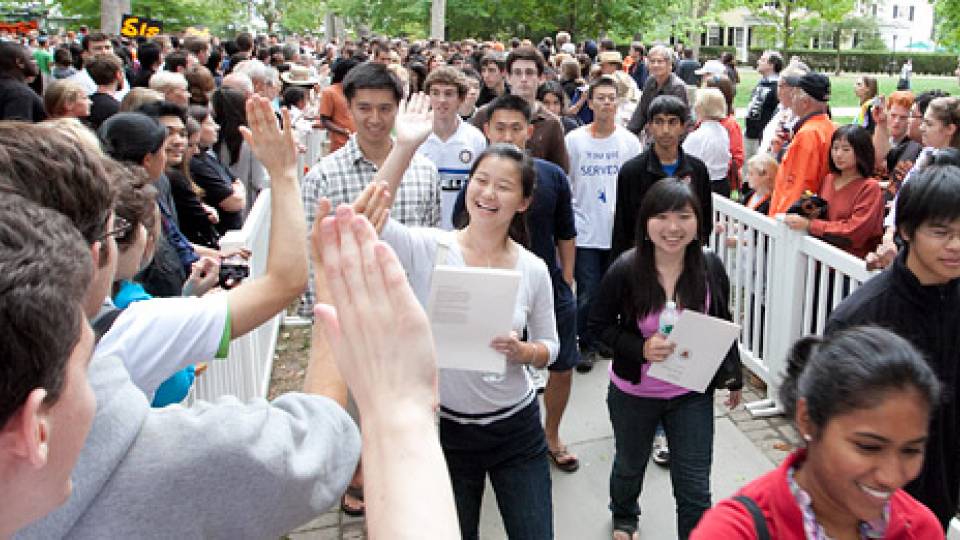Princeton President Shirley M. Tilghman encouraged students to become more "cosmopolitan" during their years at the University in her address today for Opening Exercises.
"In making your academic choices, I hope you will avoid the natural tendency to study only those subjects in which you have excelled in high school, or to take only those courses that your friends are taking, or those that you believe will, in some narrow way, prepare you for the job market," said Tilghman at the interfaith service that traditionally marks the start of the academic year.
"Our distribution requirements, our freshman seminar program, our emphasis on independent work are all designed to widen your intellectual horizons so that you will leave here a cosmopolitan (a word I take from Professor Anthony Appiah, who joined us this year) -- meaning a person whose spirit is informed by a deep understanding and appreciation of the world in all of its manifold subtlety and complexity."
She noted that the students could have chosen to attend other institutions where they could have satisfied requirements by taking courses in only one area or by skimming the surface of a broad range of fields.
"By choosing to come here, you rejected these models in favor of one that seeks to produce broadly and deeply educated citizens who are capable of providing thoughtful leadership in an increasingly complex and challenging world," she said. "The most difficult political, technological, ethical and social problems facing today's world will be resolved only by intelligent and well-trained minds that can think critically and decisively using understanding that draws on many fields and yet transcending disciplinary boundaries."
Looking out over the audience that filled the main floor and balcony of the University Chapel, she advised the students to keep open minds.
"As you begin your journey, I hope you keep in mind that you are preparing yourself for an uncertain future, and that the best preparation is to develop habits of mind that lead you to test the things you think you do know and be curious about the things you do not know," she said. "Your best insurance against uncertainty and complexity is to develop an insatiable appetite for new ideas and an instinct for informed fair-minded reasoning as your first line of defense."
Addressing specifically the freshmen, Tilghman said they had been chosen with "enormous care." She noted that they represent a variety of ethnic groups, religions and socio-economic backgrounds.
"A good part of your education in the next four years will come from conversations with your classmates and other students," she said. "Each of you will bring to these conversations a unique perspective on the world. Each of you is a resource for all the others. Whether you are in a freshman seminar on poverty, a political debate over the Palestinian-Israeli crisis or a discussion on the meaning of religious faith, you will be learning from one another in ways that may be different, but are just as important as the ways you will learn from the faculty."
The importance Princeton places on diversity was aptly represented by the Opening Exercises ceremony itself. As the classical organ prelude faded, those inside the chapel heard the growing sound of samba music. Drummers and saxophonists led the processional of University administrators and faculty members down the center aisle. The lively music contrasted with the traditional academic garb. Colorful kites on poles flew under the gothic arches. Students offered readings from a variety of faiths.
"So just as I have urged you to be bold and adventurous in your choices of courses, I also urge you to reach out to your classmates, especially those who are different from you and from whom you have something new to learn," Tilghman said. "Please avoid the natural tendency to seek out those who are most like you. While it is a perfectly understandable reaction to an unfamiliar environment, it is also one of the most effective ways to narrow your horizons and to reduce your opportunity to become a true cosmopolitan."
Princeton has a particular advantage when it comes to fostering relationships and community, Tilghman said.
"Princeton University is a human community in which every individual matters," she said. "One of our greatest strengths is our small size that makes it possible for everyone to be an integral part of the whole."
"From the Nobel laureate who teaches freshman biology, to the janitor who takes care of the dorms, to the dean who hears disciplinary cases, to the librarian at the information desk in Firestone, to the night nurse at McCosh, to the groundskeeper who rakes the leaves and shovels the snow, to the coach or the adviser who provides good counsel, to the electrician whose amplifier is making my voice audible to you -- we are proud of the dedication that so many bring to our community," she continued. "I hope that as you go about your busy lives here you will treat each member of this community with dignity and respect."
Tilghman told the freshmen that the University has high expectations for them: "Princeton's informal motto, 'Princeton in the nation's service and in the service of all nations,' defines our hope and aspiration that you, the class of 2006, will leave Princeton as your predecessors have done, prepared to make a positive difference in the world."
She concluded her address by offering a few more words of encouragement.
"I hope each of you is filled with a sense of excitement today," Tilghman said. "I am sure that I speak for the entire University community when I say that we are eagerly anticipating the choices you will make. We look forward to witnessing and sharing in your journey to become the great -- and cosmopolitan -- Princeton class of 2006."
President Tilghman's full address is available online.




